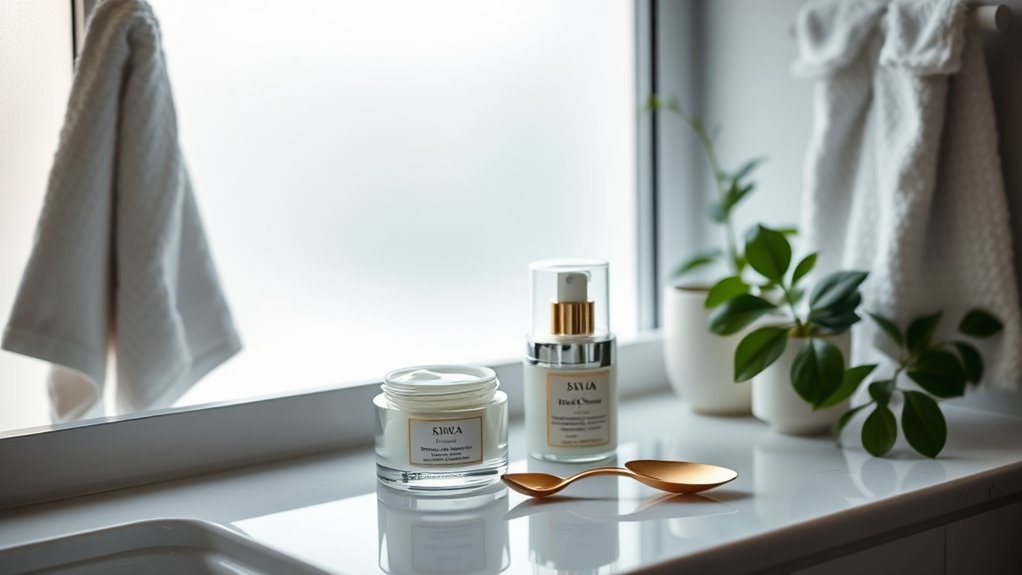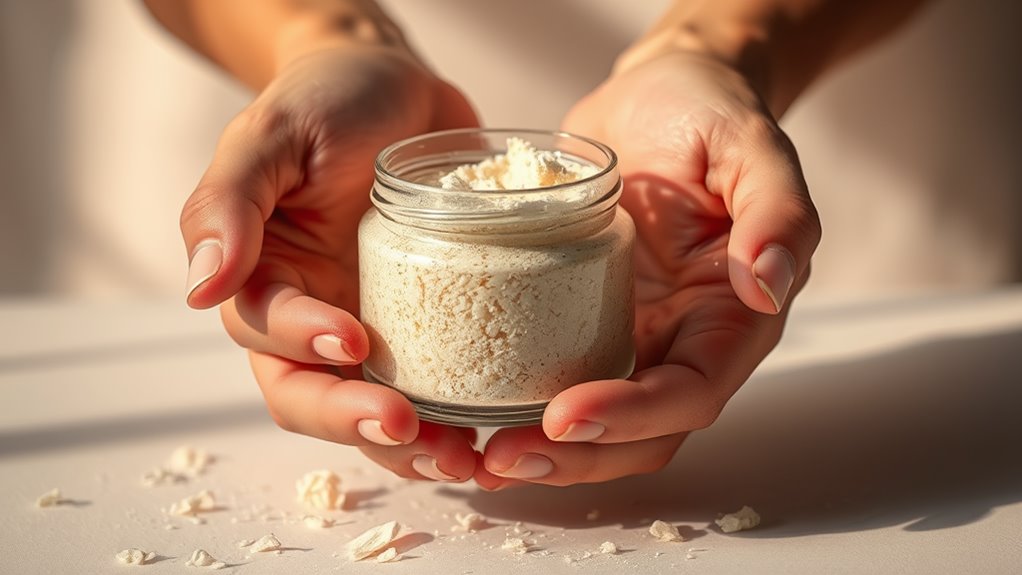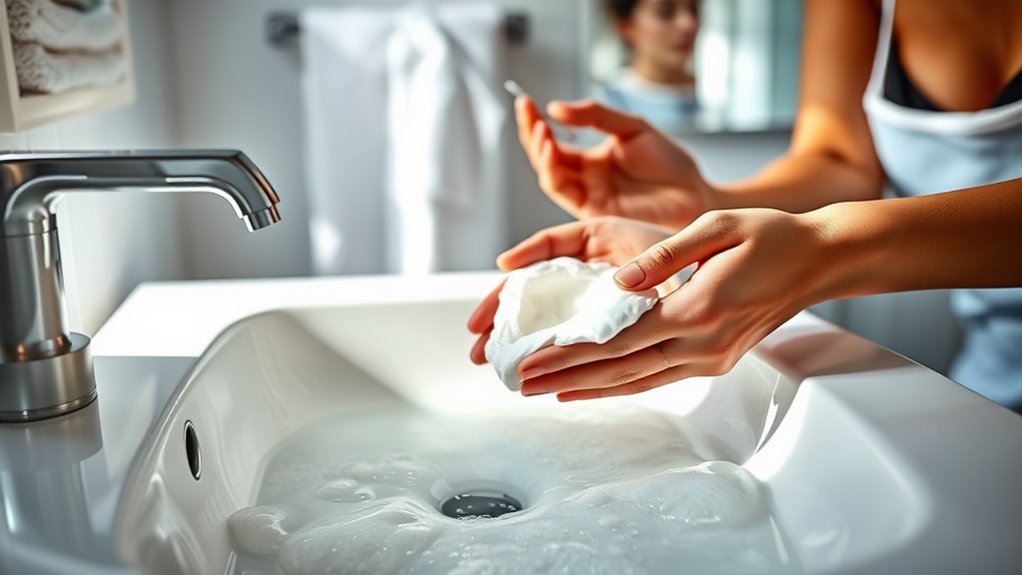The Best Skincare Trick I Learned From a Dermatologist
The best skincare trick you’ll learn from a dermatologist is to understand your unique skin type and tailor your routine accordingly. Identify whether your skin is oily, dry, combination, or sensitive, and choose products that address these specific needs. Consistency in your skincare regimen enhances its effectiveness and builds your skin’s tolerance. By paying attention to hydration, exfoliation, and active ingredients, you can significantly improve your skin’s health. Discover more insights to elevate your skincare game.
Key Takeaways
- Identify your skin type to choose appropriate products, ensuring effective cleansing and treatment for specific needs.
- Consistency in your skincare routine is crucial; it enhances ingredient effectiveness and builds skin tolerance over time.
- Incorporate exfoliation gently into your regimen to promote cell turnover and improve skin texture, using the right method for your skin type.
- Always prioritize hydration and apply broad-spectrum sunscreen daily to protect against UV damage and maintain skin’s moisture barrier.
- Regularly assess your skin’s response and consult a dermatologist for personalized advice and adjustments to your skincare routine.
Understanding Your Skin Type
Understanding your skin type is crucial for effective skincare. It’s the foundation upon which your entire regimen should rest.
A dermatologist skincare tip emphasizes the importance of identifying whether you have oily, dry, combination, or sensitive skin. Each skin type reacts differently to products, so knowing yours helps you choose the right ingredients.
For instance, if you have oily skin, look for non-comedogenic products that won’t clog pores. Conversely, if your skin is dry, opt for rich moisturizers that hydrate effectively.
You can determine your skin type by observing how it feels throughout the day or conducting a simple blotting test. This knowledge empowers you to tailor your skincare routine for optimal results, enhancing its effectiveness and your skin’s overall health. Additionally, understanding your unique skin type can guide you in selecting formulations that deliver the best results for your specific needs.
The Importance of Consistent Skincare
Once you’ve identified your skin type, the next step is to establish a consistent skincare routine.
Consistency is key to achieving and maintaining healthy skin. When you commit to a routine, you enable your skin to adapt and respond positively to the products you use.
Here are three reasons why consistency matters:
-
Enhances Efficacy: Regular use of products allows active ingredients to work effectively, promoting long-term benefits.
-
Builds Tolerance: Your skin can adapt to treatments, reducing the likelihood of irritation and maximizing results over time.
-
Establishes a Barrier: A consistent routine helps strengthen your skin’s natural barrier, protecting against environmental stressors. Additionally, a consistent skincare routine can prevent various skin issues from arising, ensuring your complexion remains healthy and balanced.
Choosing the Right Cleanser
Choosing the right cleanser is essential for maintaining healthy skin. Consider your skin type to ensure you select a product that meets your specific needs, and be mindful of ingredients that could irritate or harm your complexion. For instance, using a cleanser formulated for your specific skin type can significantly enhance your skincare routine.
Skin Type Considerations
When selecting a cleanser, it’s essential to consider your skin type, as using the wrong product can lead to irritation or dryness.
Understanding your specific needs ensures you achieve optimal results. Here’s how to choose wisely:
-
Oily Skin: Look for gel-based or foaming cleansers that help remove excess oil without over-drying.
-
Dry Skin: Opt for cream or lotion cleansers that provide hydration and prevent moisture loss during cleansing.
-
Sensitive Skin: Select fragrance-free, gentle formulations to minimize irritation and maintain skin barrier integrity.
Ingredients to Avoid
Selecting the right cleanser means being aware of harmful ingredients that can compromise your skin’s health.
First, avoid sulfates, as they can strip natural oils, leading to dryness and irritation. Fragrances, both synthetic and natural, can provoke allergic reactions and sensitivities, so steer clear of them.
Alcohol-based cleansers can disrupt your skin barrier, causing redness and inflammation. Additionally, parabens and phthalates may disrupt hormonal balance; opting for paraben-free and phthalate-free products is wise.
Lastly, be cautious with high concentrations of alpha and beta hydroxy acids; while beneficial in moderation, they can be overly harsh if misused.
The Role of Exfoliation
Exfoliation plays a crucial role in your skincare routine by removing dead skin cells and promoting cell turnover. You can choose between physical and chemical exfoliants, each offering unique benefits for your skin. Understanding these options helps you achieve a smoother, brighter complexion. Regular exfoliation benefits can significantly improve your skin’s texture and overall appearance.
Types of Exfoliation
Maintaining healthy skin often hinges on effective exfoliation, a crucial step in any skincare routine.
There are two primary types of exfoliation that you should consider integrating into your regimen:
-
Physical Exfoliation: This involves scrubs or tools that manually remove dead skin cells. It’s essential to choose gentle options to avoid irritation.
-
Chemical Exfoliation: Utilizing acids like AHAs or BHAs, this method dissolves dead skin cells and promotes cell turnover. It suits various skin types when used appropriately.
-
Enzymatic Exfoliation: Derived from fruits, this gentle approach uses enzymes to break down dead skin without the harshness of scrubs or acids, making it suitable for sensitive skin.
Understanding these types will empower you to select the best exfoliation method tailored to your skin’s needs.
Benefits for Skin
When you incorporate exfoliation into your skincare routine, you’ll notice a myriad of benefits that can transform your complexion.
This essential step helps to remove dead skin cells, promoting cell turnover and revealing fresher, healthier skin beneath. By unclogging pores, exfoliation reduces the likelihood of breakouts and minimizes the appearance of acne scars.
It also enhances the absorption of your skincare products, allowing active ingredients to penetrate more effectively. Additionally, regular exfoliation can improve skin texture and tone, leading to a more radiant appearance.
Over time, you’ll notice a reduction in fine lines and an overall youthful glow. Embrace exfoliation, and you’ll unlock your skin’s true potential, achieving a smoother and more vibrant complexion.
Hydration: The Key to Healthy Skin
Hydration plays a crucial role in achieving and maintaining healthy skin, as it helps to retain moisture and supports the skin’s natural barrier.
When your skin is well-hydrated, it appears plumper and more radiant. To master hydration, consider these key strategies:
-
Drink Water: Aim for at least eight glasses a day to keep your skin hydrated from within.
-
Use Humectants: Incorporate products with ingredients like hyaluronic acid and glycerin to draw moisture into the skin.
-
Avoid Hot Showers: Hot water can strip your skin of essential oils, so opt for lukewarm water when cleansing.
Additionally, choosing the right moisturizer is essential, as some may contain ineffective ingredients that do not provide the hydration your skin needs.
Sunscreen: A Non-Negotiable Step
Although many people underestimate its importance, sunscreen is an essential step in any skincare routine. It protects your skin from harmful UV rays, which can cause premature aging, sunburn, and increase the risk of skin cancer.
To maximize its effectiveness, choose a broad-spectrum sunscreen with an SPF of at least 30. Apply it generously to all exposed areas of your skin, including hard-to-reach spots like your ears and the back of your neck. Reapply every two hours, or more frequently if you’re swimming or sweating.
Incorporating Active Ingredients
Incorporating active ingredients into your skincare routine can significantly enhance its effectiveness, especially when targeting specific concerns like acne, hyperpigmentation, or aging.
To achieve optimal results, consider these key active ingredients:
-
Retinoids: Promote cell turnover and collagen production, helping to reduce fine lines and improve skin texture.
-
Vitamin C: Acts as a potent antioxidant, brightening the skin and diminishing dark spots while boosting collagen synthesis.
-
Hyaluronic Acid: Provides intense hydration, plumping the skin and improving elasticity, making it ideal for all skin types.
When integrating these ingredients, start slowly to gauge your skin’s response.
Layer them thoughtfully, ensuring you maintain a balanced routine that maximizes their benefits without causing irritation.
Consistency is vital for achieving your desired results.
Listening to Your Skin’s Needs
Understanding your skin’s unique needs is essential for developing an effective skincare routine. Each day, your skin might react differently due to factors like climate, stress, or hormonal changes. Pay attention to these signals—if your skin feels tight or appears red, it might be craving hydration or soothing ingredients.
Conversely, if you notice excessive oiliness or breakouts, it could indicate a need for balancing products. Adjust your regimen accordingly, and don’t hesitate to simplify it when necessary. Quality over quantity matters; fewer, targeted products can yield better results.
Regularly assess how your skin responds after introducing new items, ensuring your approach remains responsive to its evolving needs. Mastering this skill will significantly enhance your skincare journey.
Seeking Professional Advice
When you’re unsure about the best way to care for your skin, seeking professional advice can provide the clarity you need.
A dermatologist can assess your unique skin type, concerns, and goals, tailoring a regimen that works for you.
Here are three key benefits of consulting a professional:
-
Personalized Recommendations: Get a skincare routine specifically designed for your skin’s needs.
-
Effective Treatments: Discover advanced treatments and products that target specific issues, like acne or hyperpigmentation.
-
Ongoing Support: Benefit from follow-up consultations to adjust your routine as your skin evolves.




